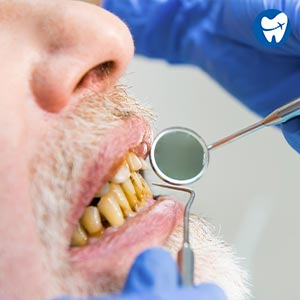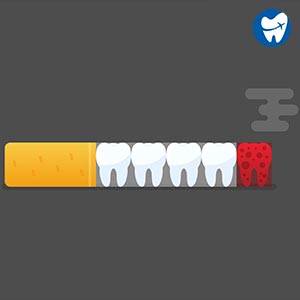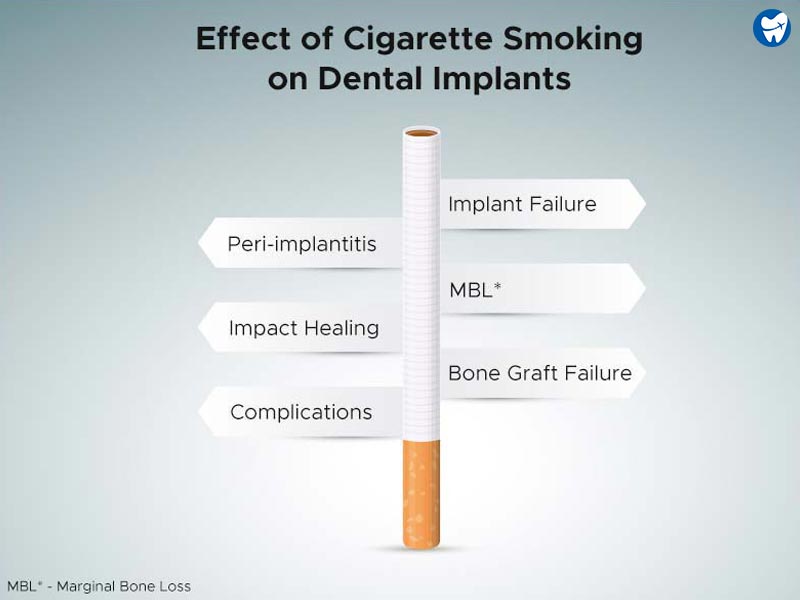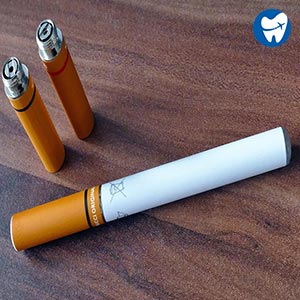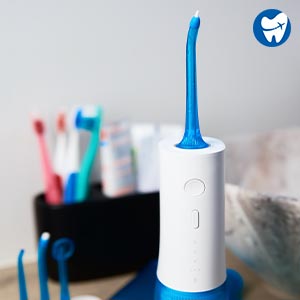Smoking and dental implants are off-key and can't go together. Dental implants are a popular long-term replacement option for missing teeth.
However, smoking can affect the outcome deleteriously. In this article, we help you understand the effects of smoking on dental implants. Take a look!
Smoking and Dental Implants
It is no mystery that smoking is bad for your health.
For people who smoke, dental implant surgery may not always be successful. [1]
Many deadly diseases such as lung cancer, stroke, coronary heart disease, and pneumonia are associated with smoking. [2]
But you might not know that smoking also affects your oral health. Do you know how long to avoid smoking while undergoing dental implant surgery?
Let’s get started and find out ways to take care of implants as a smoker.
Smoker’s Teeth
Cigarette Ruins Teeth
In the oral cavity, smoking interferes with the functioning of many cells, which maintain oral health and repair wounds in the mouth.
Smoking can delay the healing following gum surgeries and dental implant procedures. [4]
How Does Smoking Affect Dental Implants?
Dental implants have become a widely accepted option for replacing missing teeth.
Your current oral health and habits will matter when you visit your dentist for a dental implant.
A question that you can expect your dentist to ask is, “Do you smoke?”
They ask this because smoking reduces implant life or causes failure. So, it is considered bad for implant health. [5]
Effects of Cigarette Smoking on Dental Implants
Implants must integrate with the jaw bone to be successful. This process requires oxygen and nutrients brought by blood vessels.
Tobacco in cigarettes can:
✅ Interfere with immune cells
✅ Stop bone-forming cells from multiplying
✅ Constrict the blood vessels, which lowers blood & nutrient supply to the bone
✅ Interfere in production of connective tissue between implant and bone
Without oxygen and nutrients, healing is delayed. Weakened immunity increases the chances of infection.
So, the risk of implant failure increases with smoking after dental implants. [6]
Can I Have Dental Implants If I Smoke?
Yes, you can. Being a smoker does not exclude you from this treatment option.
But smoking regularly can significantly increase the risk of dental implant failure.
So, you are asked to refrain from smoking until healing completes.
Besides, following a proper oral hygiene regime as recommended by a dentist will help you increase the survival of dental implants.
Smoking Increases Implant Failures
When Should I Stop Smoking If I Want Dental Implants?
Generally, the accepted protocol is to quit smoking a week before and eight weeks after implant placement. [7]
It allows early bone healing, which helps establish an initial fusion between the bone and the dental implant.
Do I Need to Quit Smoking Before or After the Dental Implant Surgery?
Ideally, you should quit smoking before getting a dental implant.
Smoking increases the risk of infection and bone loss around implants. [8]
So, it’s better to quit smoking before implant placement to reduce your susceptibility to post-op complications.
Can I Smoke After Getting All on 4 Implants?
Ideally, you must stop smoking for at least 8 weeks after getting all-on-4 implants.
Smoking allows the adsorption of nicotine into the bloodstream, causing constriction of blood vessels. [9]
This, in turn, hampers the supply of nutrients to the bone around implants, impairing healing.
Smoking is also not advised for mini implants for the same reasons as described above.
Basically, the implant type does not matter because smoking hinders the union of bone and implant, [10] regardless of the type.
Has Anyone Smoked After Dental Implants?
Yes, relapse after implant placement is common as smoking is addictive. [11]
But be sure to inform your dentist about the relapse to optimize the care plan.
Are E-Cigarettes Safer for Dental Implants?
Unfortunately, no! Vaping is marketed as a safer option, [12] but it is risky for dental implants.
Vaping
Electronic cigarettes
E-cigarettes still contain nicotine and other compounds which interfere with bone formation and healing. [13]
Although there is a lack of studies that directly correlate vaping and implant life, dentists generally will not support vaping as a safer option.
How Can I Care for Dental Implants If I Smoke?
If you cannot quit smoking altogether, make sure that you maintain proper oral hygiene by:
- Flossing daily
- Brushing twice a day
- Visiting dentist at regular intervals
- Following all dental instructions
Also, you can use additional hygiene devices for implant cleanings, such as:
Interdental Brushes
Oral Irrigators
Conclusion
To sum up, smokers are not completely excluded from getting dental implants.
However, the risk involved & precautions to take will be explained by your dentist.
Quitting smoking for the minimum recommended period will result in more successful implant treatment.
Also, it will lengthen the life of your implants.
FAQs
Yes, smoking is considered bad for dental implants.
Smoking impairs the healing and interferes with the integration of dental implants with the surrounding jaw bone.
It negatively impacts the success of the dental implant procedure.
Nicotine in cigarettes constricts blood vessels which lower the blood and nutrient supply to the bone around implants.
This slows down the healing and may abstain bone-implant integration, resulting in treatment failure.
Smoking is a leading risk factor for implant failure.
Smokers experience a 2.5 times greater implant failure rate than non-smokers. [15]
That is not to say that all implants fail in smokers. But extra precautions are required for smokers who opt for implants.
